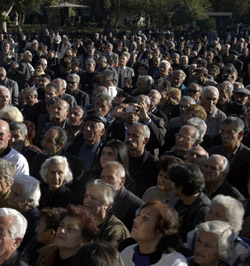Recently there was a very interesting TV debate with the NDU head, Vazgen Manukyan, and the head of the ARF parliamentary faction, Levon Mkrtchyan. During the TV debate Vazgen Manukyan was insisting that the Constitutional referendum was violated and there were ballot stuffings and fraud, as for Levon Mkrtchyan, he was not denying that fact but said that “regardless of anything, Armenia not has a good constitution.”
This is special for Armenia. In fact one of them thinks that everyone should follow the law and democracy, the other one thinks that the most important thing is the results and these results can be reached by all means.
This TV debate is not an innovation. But the civil world has already given its reply to this issue saying that anyhow the purpose doesn’t justify the means. Of course, humanity has understood this after experiencing wars and battles. The French revolutionists of 18 century came to power by using slogans speaking about equity and taking out capital punishment. As a result, during the next three years they brought much more cases of capital punishment then their country had experienced during the past century. The Soviet Union punished 20 million innocent people under the slogans of building a “bright future”, Hitler thought he was doing his best for Germany, etc. At the same time all these catastrophes have one thing in common: these kinds of things happen only when the “authorities think that people don’t understand what is good or bad for them and if they cheat them or do what they want by pressure, later people will thank them”. This is how despotism is built. As a rule despots don’t want to do bad for their country, but they act and do what they want on behalf of the whole nation and in the end the country depends on the wish of only one person (or one political power), which leads to catastrophe. Theoretically despots can do good things for their country, but in practice usually it is the vice versa.
Now let’s turn to our reality. Who said that our new Constitution is good? Please note that the problem is not whether the Constitution is good or bad (personally I think these changes are not so good). The problem is who the decision maker is. This time the decision maker was not the public for sure. So who did make a decision on behalf of the public? In other words, who was the personality or political power that thought that people didn’t understand what was good or bad for them and they had a right to decide instead of them? Why do we need laws in this case?
According to the same logics we may assume that it was good of the authorities to leave the citizens living in the center of Yerevan out of their apartments to build multi-story buildings instead. As a result, the center will become more beautiful and instead of those old houses there will be beautiful multi-story buildings there… Yes, we agree that the purpose is very good for us, but no one has a right to violate the law for this purpose. It is good to have a beautiful nation too, so should we kill all ugly citizens? It is good to plant trees too, should they oblige businessmen to spend money and plant trees? It was good to protest against annihilating the Armenian monuments in Old Jugha, but should they force all pupils and students to go and protest in the Republic Square and tell them that those who didn’t take part would fail their exams?
This is the difference between the Eastern and Western countries. The Western countries are independent inside, but they apply their independence in other countries too by different means (for instance they bomb Iraq in favor of a “bright future”). As for the Eastern countries, not being able to apply their own ideologies in other countries, they apply it in their own country by using power (for instance by violating elections).
The current authorities of Armenia currently follow the Eastern model, but meanwhile demonstrate that they like the Western model better. This means that the governmental system is built on fraud and this is the main problem in the basis of our governmental system.

